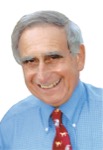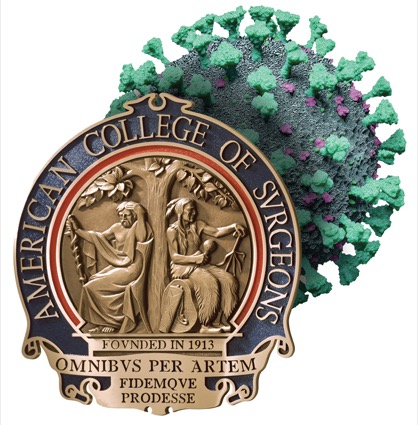
The American College of Surgeons has chosen as its theme for the 2020 Clinical Congress: The Joys of Learning, Collaborating and Giving Back. In this cataclysmic year of COVID-19 with its fatalities, casualties and severe economic consequences, the ideas and subjects chosen for presentation involve the telling of scientific truths about COVID-19—about what is known, what is unknown, and what needs to be discovered.
We have been and continue to be subjected daily to a bombardment of emails, other electronic communications and media messages advertising the availability of videos and commentaries by “experts”—real and otherwise—as well as by webinars, Zooms and town meetings to be joined, free, all of them eager to inform us of a particular perspective on the COVID-19 pandemic. This endless stream of material contains kernels of real data within a morass of misinformation, disinformation and texts from those seeking notoriety for adding their perspectives.
In addition, the delayed, misleading or erroneous statements, made by some of the world’s most prominent health care and pandemic professionals, possibly fearful of losing their appointments, have also contributed to the harm caused within this vaudeville atmosphere. Further, we have received and continue to receive misguided and ambiguous statements from our national and regional leadership, motivated by personal interests and politics rather than by rationality and science.
This babel has contributed to our unfortunate national achievement of ranking first among nations for the incidence and mortality of COVID-19. We now have over 25% of the entire world’s cases (about 6/23 million) and growing, and about 25% of the world’s known COVID-19 deaths (about 200,000/800,000), and growing. If we examine these numbers with respect to population, the United States, in September, had about 17,000 cases per 1 million people compared with about 3,000 per 1 million for the rest of the world (about a sixfold increase), and about 525 deaths per 1 million compared with about 100 for the rest of the world (about fivefold).
With the prevailing infection and mortality rates in the United States, annual COVID-19 death will be 10-fold the annual seasonal flu mortality. COVID-19 is the third leading cause of death in the United States, surpassed only by heart disease and cancer. Although recovery from the seasonal flu is usually total, current data of residual COVID-19 pathology do not support this expectation.
The 2020 virtual ACS Congress is dedicated to the dissemination of COVID-19 scientific truths. The program committee set aside seven special and panel sessions, comprising six hours and 45 minutes of lectures, symposia and discussions, over three meeting days, committed to the COVID-19 crisis. The presentations cover the tripartite 2020 congress themes of learning, collaborating and giving back. This knowledge has the potential to initiate an intelligent containment response.
Special Session 341 of the ACS meeting, titled Transformation of Residency Training in Surgery: COVID-19 Pandemic and Beyond (Monday, Oct. 5, 12 p.m.), was founded on its function of educating the next generation. In many institutions around the country, the COVID-19 first responders have been surgeons, including surgical residents. Until now, very few surgeons were trained in viral isolation procedures, in and out of the OR, critical care for fluid-filled lungs, and ECMO (extracorporeal membrane oxygenation) management under these conditions. This knowledge for the present should be considered necessary for the future curriculum of residency training.
Special Session 441 is a presentation called Leadership, Workforce, Communication During COVID-19 Pandemic: Lessons Learned (Tuesday, Oct. 6, at 12 p.m.). I presented examples of exemplary leadership in my August column, wherein I outlined the responses of three hospitals across the country—EvergreenHealth, in Kirkland, Wash.; NewYork-Presbyterian/Weill Cornell Medical Center, in New York City; and M Health Fairview Bethesda Hospital, in St. Paul, Minn.—as well as the ACS. Although they learned on the job, the hospitals performed admirably. They organized responsible workforces and established communication networks. Above all, they provided rational and calm leadership, an attribute lacking in our national and so many state governments. The ACS promulgated clinical guidance, ethical considerations, a surgical triage protocol, and a call for Operation Giving Back volunteers, as well as the establishment of a registry of data for future reference in the event of another infectious pandemic. This was true leadership by taking action, by being in the forefront, and by taking responsibility.
The remaining five congress sessions are all special COVID-19 panels. Their subject titles include Impact of the COVID-19 Pandemic on Intimate Partner Violence; COVID-19 Related Respiratory Failure; Well-Being Challenges During COVID-19 Pandemic: Preparing for the Next Crisis; COVID-19 Related Critical Care Management Issues; and COVID-19 and Surgery: The International Perspective. These are not surgical specialty sessions but timely universal discussions for all of us as general surgeons.
Beyond the 2020 virtual congress and into the future of COVID-19, scientific truths will be our guides for dealing not only with the disease as surgeons, but as we conduct our daily lives, and in our family and community lives. We will move forward to discover the infection rate; mortality rate and distribution; prevalence and validity of testing for infection and immunity; modes of disease spread; and relative effectiveness of isolation, masking, social distancing and other methods of containment. Also important to our lives will be understanding the risks of travel; the status of antiviral drugs; and the availability, safety and effectiveness of vaccines.
How will we obtain these scientific truths? We will accumulate data, perform statistical analyses, start registries, and use computer simulations and animal testing. We will perform randomized controlled trials. In other words, we will do what we have done as the cornerstone of modern medicine: We will follow the scientific method, and we will listen to those who do so.
I quote David B. Hoyt, MD, the executive director of the ACS: “In responding to this event, we just build upon the infrastructure that we have, which again is designed to try and serve all—not just all patients—but serve everyone involved with surgery.”
We will learn from experience—the experience of others and ourselves. Some nations have been exemplary in their response to COVID-19, countries able to prevent or control this pandemic: New Zealand, South Korea, Norway, Germany and others, although they will have setbacks. They were able to do so without drugs, without a vaccine, using containment, by combinations of universal testing, rapid isolation of the infected, quarantining of contacts, masking, social distancing, and a closure of public facilities. These countries accepted a short-term sacrifice to their economy in order to preserve it for the long term. They made the lives and health of their people the primary concern of government.
As practicing physicians and surgeons, we base our therapeutic decisions and the recommendations we make to our patients on experience as well as on scientific evidence. There is an old adage: Good judgment is gained by experience; experience is the result of bad judgment. If that is true, we as a nation have made enough bad decisions for the nation to have gained the requisite experience to now make good decisions.
The SARS-CoV-2 virus that causes COVID-19 consists of single-stranded RNA, its genetic blueprint consisting of the nitrogen bases of adenine, cytosine, uracil and guanine, linked to the sugar ribose. Bound to the string of RNA are nucleoproteins that give the virus its spatial structure. Encapsulating the viral core is the viral envelope of lipids and the spike proteins that allow the virus to penetrate cells. The virus cannot replicate itself; it requires a host cell for survival. We are, therefore, dealing with a complex biochemical. It is, in essence, a chemical, not a being. A chemical does not favor the policies of a political party or politicians. A chemical is entirely unaware of complex beliefs of religion, laws, national constitutions. Yet, every day, this chemical promotes misery, kills and destroys the structure of society. This virus is the vector of a disease pandemic, but it is still only a chemical without a creed.
A hallmark of civilization has been specialization. A nation maintains armed forces to counter outside threats, police to control crime, firefighters to fight fires, and health care professionals to combat and prevent disease. As health care providers, COVID-19 is our responsibility, and it is our duty to vanquish it. To overcome COVID-19, the ACS, other professional societies, scientists, physicians, nurses and medical industries must work together to defeat this virulent chemical by adherence to scientific truths and by commitment to our oaths as healers. We must continue to be the voices of hope in this ongoing time of crisis.
Dr. Buchwald is a professor of surgery and biomedical engineering, and the Owen H. and Sarah Davidson Wangensteen Chair in Experimental Surgery (emeritus), at the University of Minnesota, in Minneapolis. His articles appear every other month.



Please log in to post a comment
It so obvious that patients with Herpes virus are being enslaved to the antiviral drugs that is being prescribed by medical doctors to help suppress and not to cure them completely from the virus they have been battling with "a society that keeps cure a secret so they can continue to sell medication for huge profits is not a real society but a huge mental asylum" I suffered from Herpes virus for three years using medical treatment hoping that one day God will do wonders In my life, a stranger I met at the park felt sorry when I share my story of how I was raped and got infected with this disease she immediately introduced me to herbalist oduntun from west africa I was convinced that he can cure me completely from the virus so I decided to go into natural remedy with herbalist oduntun.I contacted him on What'sApp we discussed and he explained everything to me how I will get the herbal medication, the prescription and food diets i will be on while taking the herbal medicine, I was on medication for 21 days following these rules without eating meat or any diary product. (i'm on plant base ) I give thanks to God almighty for leading me to the stranger that introduced me to this genuine herbal doctor I'm really grateful ?? for more information on how to reach him here is his email address: herbalistoduntun@gmail.com or what'sApp number: +2349039463501 stay safe And Good luck.
God bless Dr Biya jatto for his marvelous work in my life, I was diagnosed